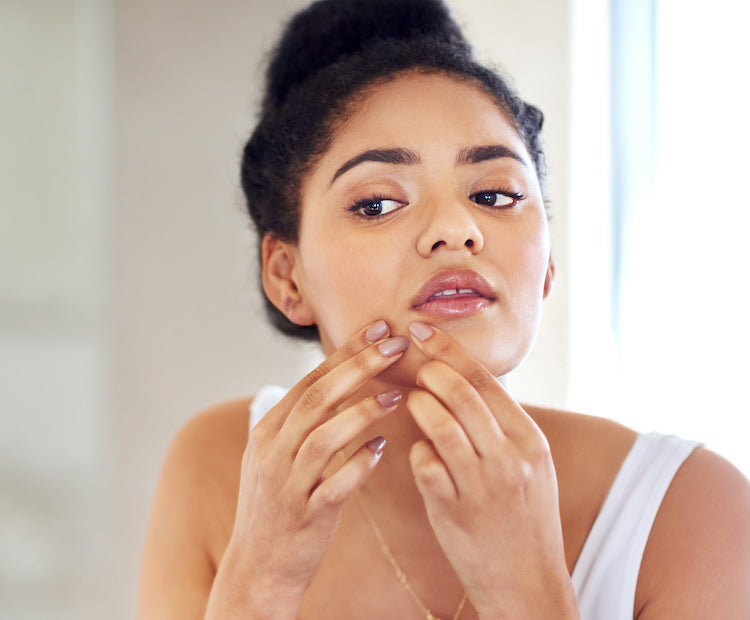Preventing Acne With Diet?

Acne is the most common skin condition in the U.S. About 85% of people experience acne during their teenage years, but it can occur at any age. Acne is more than just pimples and it can leave permanent scars. In many people, acne can seriously affect quality of life, causing low self-esteem, withdrawal from social situations, anxiety, and depression.1
There are four major components of acne2:
- Excessive production of oil by the skin
- Skin cells dividing excessively or “hyperproliferation”
- Bacteria
- Inflammation
A pimple or lesion forms when a pore in the skin begins to clog with old, dead skin cells. Usually these cells are simply shed from the surface of the skin, but if too much oil is being produced, the dead cells can stick together and become trapped inside the pore. Bacteria also play a role, they can grow and multiply inside the pore, resulting in an inflammatory response.1
Scientific studies have demonstrated that the diet is very important, because what we eat can affect the hormones that contribute to the oil production, hyperproliferation, and inflammation that cause acne. The two acne-promoting dietary factors that have been most extensively studied are dairy products and high glycemic load foods. These factors influence hormonal and inflammatory factors increasing acne prevalence and severity.3,4 Hormonal influences that raise insulin and insulin-like growth factor 1 (IGF-1) levels are key.5 Elevated IGF-1 levels lead to changes in gene expression that cause inflammation, hormonal changes, increased oil production, and development of acne lesions. Of important concern is that the same hormonal milieu of high IGF-1 and high insulin, also promotes breast and prostate cancer, so it is important to maintain a diet that is hormonally favorable all through life.
In addition to dairy and high glycemic foods, excessive oil production by the skin can be exacerbated by oil intake. Vegetable oils drives omega-6 intake up, which have pro-inflammatory effects, and high omega-6 intake is associated with the development of acne.4,6-8 The effects of oil intake on acne is exacerbated by the consumption of high glycemic carbohydrates, such as commercial baked goods. Higher intake of omega-3 fatty acids is associated with reduced likelihood of acne, as omega-3s counteract the pro-inflammatory processes that drive acne. Just because overeating nuts and oil (especially peanuts and peanut butter) can contribute to sebum production and acne, does not mean nuts and seeds need to be eliminated from the diet to help acne. It is the combination of the glycemic load of the diet and other hormonal promoters acting together to produce acne. So excessive intake of fat may increase sebum production, but this tendency is permitted and exacerbated by the glycemic effect of the diet. When your diet has more beans, greens, seeds, onions and mushrooms, and is free of high glycemic carbohydrates, it can tolerate more fat, without any acne-promoting effects on sebum production, because the antioxidant and phytochemical exposure is higher, and the glycemic load of the diet is lower. So up to two ounces of raw nuts and seeds can generally be eaten by those on an oil-free Nutritarian diet without creating acne. But once you start eating refined and high glycemic carbohydrates, your body will be more sensitive to the fat in your diet, maybe even from nuts.
The two most important hormonal factors that drive acne are IGF-1 and insulin. In addition to avoiding oils, to prevent or resolve acne, avoid dairy products and high-glycemic load foods, especially sweeteners and commercial baked goods and make sure to get an adequate supply of micronutrients. Remember, high glycemic carbohydrates can raise both insulin and IGF-1.
If you are in the San Diego area and would like to learn more about our services or book an appointment today, click here. If you are new to Vasseur Skincare or needed help choosing the right skincare, click here. If you would like to talk with one of our Vasseur team members for a free consultation, click here and we will get back with you as soon as we can (please allow 1-3 business days for a response).
Leave a comment
Comments will be approved before showing up.
Also in Education
Copper Serum and Red Light Therapy: Your New Skincare Power Duo
Learn how combining copper peptide serum with red light therapy can boost collagen, reduce wrinkles, and enhance your skin's health for radiant results.
Green Tea Serum & Red Light Therapy: The Ultimate Skin Duo
Discover how combining green tea serum with red light therapy can boost collagen, fight aging, and give you radiant skin. Learn how to use them together.
Boost Red Light Therapy with Copper Peptide & Green Tea Serums
Learn how to combine red light therapy with copper peptide and green tea serums to enhance collagen production, reduce wrinkles, and achieve radiant skin.